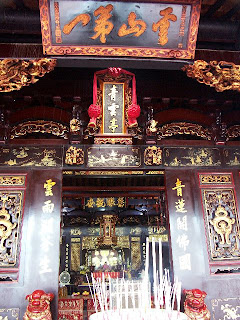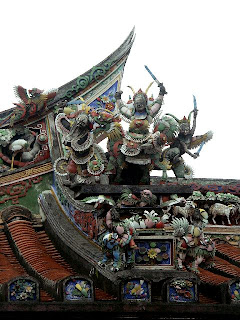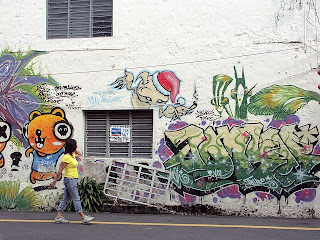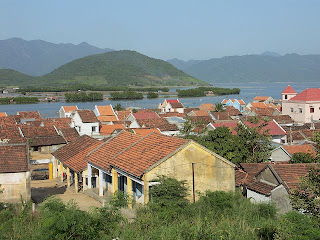In the morning, I wake up to the gracefully lilting call to prayer emanating from Kampung Kling Mosque down the street. I roll out of bed and talk down the street to visit three unlikely neighbors: a mosque, a Hindu Temple, and a Chinese Temple within two blocks on the same street, nicknamed Harmony Street. The peaceful coexistence of these three houses of worship in such close proximity over hundreds of years testifies to the religious tolerance in Melaka and Malaysia, even as the same groups of people have been at each others’ throats in other parts of the world.
The ornate Cheng Hoon Teng, dating back to 1646, is the oldest Chinese temple in Malaysia. Incense smoke wafts throughout, the temple has been restored to its original glory: the beautiful calligraphy in gold inlaid set in shiny black lacquered panels, delicately carved windows and offering tables with gold trims, ceramic deities sitting atop curving eaves. No details have been overlooked. Sitting down at a cool spot, I admire the temple, listen to the Buddhist chants, and watch dozens of tourists come in to burn incense and make offerings.
Next I walk down the street and, just as the Buddhist chants are out of earshot, come upon the green-roofed Kampung Kling Mosque. This is one of the oldest mosques in Malaysia. Built in the Sumatran style instead of Arabic, the main prayer hall has a double roof instead of a dome. The minaret looks more like a pagoda than the slender minarets at other mosques. Compared to the Chinese temple, the mosque is downright spartan. With graceful Arabic calligraphy over the entrance, the mosque is quiet. As non-Muslims are not allowed to enter the prayer hall, I would have to be content with walking around the open areas.
Literally right next door is Sri Poyatha Venayagar Moorthi Temple. Again, it is one of the oldest Hindu temples in the country. Hindu temples are always a pleasure to visit. Visitors are welcomed by a riot of colors. Throughout the temple, a myriad of statues of deities in vibrant colors stand in various poses in front of walls painted in bright pastel. Fragrant garlands adorn some of the statues, and some are locked behind close doors, open only to people making offerings.
After visiting these temples, it is now time to sample more of the local cuisines!
The ornate Cheng Hoon Teng, dating back to 1646, is the oldest Chinese temple in Malaysia. Incense smoke wafts throughout, the temple has been restored to its original glory: the beautiful calligraphy in gold inlaid set in shiny black lacquered panels, delicately carved windows and offering tables with gold trims, ceramic deities sitting atop curving eaves. No details have been overlooked. Sitting down at a cool spot, I admire the temple, listen to the Buddhist chants, and watch dozens of tourists come in to burn incense and make offerings.
Next I walk down the street and, just as the Buddhist chants are out of earshot, come upon the green-roofed Kampung Kling Mosque. This is one of the oldest mosques in Malaysia. Built in the Sumatran style instead of Arabic, the main prayer hall has a double roof instead of a dome. The minaret looks more like a pagoda than the slender minarets at other mosques. Compared to the Chinese temple, the mosque is downright spartan. With graceful Arabic calligraphy over the entrance, the mosque is quiet. As non-Muslims are not allowed to enter the prayer hall, I would have to be content with walking around the open areas.
Literally right next door is Sri Poyatha Venayagar Moorthi Temple. Again, it is one of the oldest Hindu temples in the country. Hindu temples are always a pleasure to visit. Visitors are welcomed by a riot of colors. Throughout the temple, a myriad of statues of deities in vibrant colors stand in various poses in front of walls painted in bright pastel. Fragrant garlands adorn some of the statues, and some are locked behind close doors, open only to people making offerings.
After visiting these temples, it is now time to sample more of the local cuisines!

Cheng Hoon Teng, the Oldest Chinese Temple in Malaysia



















































